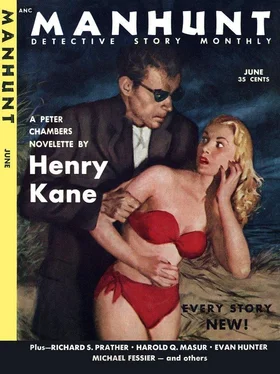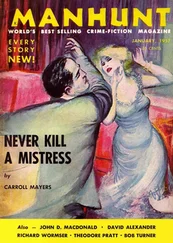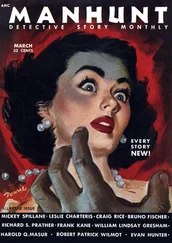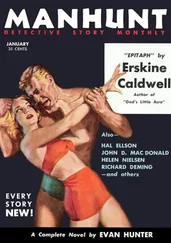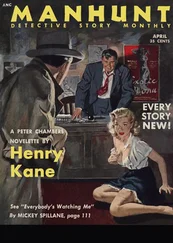Ричард Деминг - Manhunt. Volume 1, Number 6, June, 1953
Здесь есть возможность читать онлайн «Ричард Деминг - Manhunt. Volume 1, Number 6, June, 1953» весь текст электронной книги совершенно бесплатно (целиком полную версию без сокращений). В некоторых случаях можно слушать аудио, скачать через торрент в формате fb2 и присутствует краткое содержание. Город: New York, Год выпуска: 1953, Издательство: Flying Eagle Publications, Жанр: Детектив, на английском языке. Описание произведения, (предисловие) а так же отзывы посетителей доступны на портале библиотеки ЛибКат.
- Название:Manhunt. Volume 1, Number 6, June, 1953
- Автор:
- Издательство:Flying Eagle Publications
- Жанр:
- Год:1953
- Город:New York
- ISBN:нет данных
- Рейтинг книги:5 / 5. Голосов: 1
-
Избранное:Добавить в избранное
- Отзывы:
-
Ваша оценка:
- 100
- 1
- 2
- 3
- 4
- 5
Manhunt. Volume 1, Number 6, June, 1953: краткое содержание, описание и аннотация
Предлагаем к чтению аннотацию, описание, краткое содержание или предисловие (зависит от того, что написал сам автор книги «Manhunt. Volume 1, Number 6, June, 1953»). Если вы не нашли необходимую информацию о книге — напишите в комментариях, мы постараемся отыскать её.
Manhunt. Volume 1, Number 6, June, 1953 — читать онлайн бесплатно полную книгу (весь текст) целиком
Ниже представлен текст книги, разбитый по страницам. Система сохранения места последней прочитанной страницы, позволяет с удобством читать онлайн бесплатно книгу «Manhunt. Volume 1, Number 6, June, 1953», без необходимости каждый раз заново искать на чём Вы остановились. Поставьте закладку, и сможете в любой момент перейти на страницу, на которой закончили чтение.
Интервал:
Закладка:
But Mrs. Armstrong's and Mrs. Turner’s puzzlement didn’t alter the fact. Some man was calling Miss Turner.
That midnight he called again, and all the rest of the week, and they didn’t have the courage to call the police. For both of them it would be a terrible strain. He now let loose with such a new low in sexuality, when Mrs. Turner heard what he’d said (she insisted her daughter tell it all, word for word) she had palpitations and couldn’t sleep and Miss Turner herself on two occasions was violently sick to her stomach.
“Well, what are we going to do?” her mother asked at breakfast the end of that week. The night had been horrible.
Miss Turner clasped her hands. She was the picture of helplessness and total disorganization. She looked terrible. “I don’t know. I’ve done everything. I’ve appealed to his better nature, threatened to call the police, told him how ill you were. Nothing works. Frankly, mother, I’m at my rope’s end. I suppose now we’ll simply have to go to the police and get it over with.”
Mrs. Turner was painfully upset. “Oh, the police,” she said. “And the publicity.” She looked as though she were going to have an attack, and Miss Turner agreed with her attitude. Like her mother, she herself, she said, could take a few more days of it — all that abuse and the broken nights — if in the end it meant he’d get tired and stop by himself. “But I warn you, mama,” she said, shaking her head wearily, “if one more week doesn’t do it, then it’s straight to the police. I don’t think I can stand more.”
“Well, maybe the man will stop.” Her mother smiled with queer hopefulness.
The man didn’t stop. All the rest of the week everything was the same — horrible calls at all hours. There was only one change, Miss Turner reported.
Miss Turner told her mother it was something brand-new and was frightening her to death. It was no longer a matter of mere annoyance, nuisance, curiosity, or lost sleep. This was nightmare. The man had begun telling her things out of her past.
“Things out of your past?”
“Yes.”
“Such as what?”
Miss Turner got a funny look. “Well, such as: ‘What about Lemuel G.’ ” Lemuel Greer had been one of Miss Turner’s classmates, and had been considered the handsomest boy in school, star of the football and basketball teams, head of the dramatic club, a dream of a dancer; all the girls had been wild about him. He’d been elected class “dreamboat.”
“Why, what about Lemuel Greer?” her mother demanded.
Miss Turner got flustered and didn’t want to talk about it but finally had to confess. At the class picnic, she and Lemuel had gone for a stroll in the wood, found a deserted bandstand, and sat talking for hours.
“He went with you?” her mother said.
“Yes, mama. Oh, all perfectly innocent, of course.” Lemuel had merely kissed her once, that was all. It was one of her fondest memories. She’d kept it secret even from her mother.
Mrs. Turner said, “Why, Lemuel Greer married Susan Ann Blower not three months out of high school.” They were schoolmate sweethearts.
Miss Turner nodded. “Yes.” What frightened her was that nobody in the world but she and Lemuel — who, for the past 20 years, had been an oil executive in Arabia — knew anything about the bandstand business. “How did the lunatic on the telephone know?”
Also, how did he know to mention the time, just two or three months ago, some horrible man, sitting next to her in the balcony of the movie house, had let his arm slip from the back of her chair to around her waist and begged her to see the picture over again with him — until she’d threatened to call the management?
“What?” her mother said hoarsely.
There were five or six other little matters the man had brought up out of the depths of her past. “Oh, God, mama,” Miss Turner begged, “I’m going crazy. How can he possibly know?”
Her mother stared for a long moment. “Well, all right,” she said finally, resolutely. “It’s gone far enough. I don’t believe I can stand another night’s broken sleep, anyway. We’ve tried to dissuade him two whole weeks and it hasn’t worked. Now we’ll go to the police.”
That evening, on her way home from work, Miss Turner dropped in at headquarters and asked to see the chief. Chief Harrington was a tall skinny cigar-chewer with a bald head, a chronic worried look, and a kindly soft voice which he tried to make charming. He told her to sit down and listened carefully to her story.
The chief got an amused little twinkle in his eyes; it was perfectly normal — he couldn’t hide it. “Phoning you, Miss Turner?”
“Yes.”
“Saying those things right out?”
“Yes. Seems to get an awful sadistic pleasure out of it.”
The chief got down to business. He shook his head. “I don’t know what makes them tick. Nuts. We get them in spells, like clockwork.” He said there was only one way to go about it. If she could manage to wangle a date out of him and have him call for her at a certain spot, lonely or otherwise, his men could be waiting in plainclothes to pick up the nut. He leaned forward. “Do you think you could arrange it?”
“Well, he’s been asking for a date every time he’s called,” Miss Turner said.
“Think he really means it?”
“Of course he really means it.” Miss Turner appeared a trifle piqued.
The chief sat back. “Well, fine.” He put his palms together and thought a moment. “When he calls tonight make believe you’re falling for his stuff. Act a little flirtatious. When he asks for a date, tell him you’ve been thinking it over and maybe he’s not as bad as he sounds. You’ll meet him, let’s see, tomorrow night or any other night — let him set the night — and make it somewhere innocent where it won’t arouse his suspicion: Say at the last table in the Main Street Cafeteria. Our boys will be sitting around.” The chief was efficient and considerate: it was a fetish with him. “Don’t worry, Miss Turner. Our boys will see that nothing happens to you.” He grinned with conscious charm. “It’ll be as safe as a jaunt to Sunday School.”
Miss Turner got up and put on her gloves. She was sparkling. “Worry, Chief Harrington? Why, I’ve never felt better. This is an adventure.” She was flushing with pleasure, actually flirtatious. “What makes you think I go to Sunday School?”
The chief escorted her past the sergeant’s desk and when she went on alone she could distinctly hear behind her in the hollow city-hall corridor the murmur of their voices, climaxed by the sergeant’s surprised: “Her, chief?” It was genuine. Miss Turner was quite flattered. The tone was one of respect, even admiration.
The next few nights, Miss Turner put on, she thought, the act of her life. During her conversations with the man, her indignation transitioned subtly to charm and girlishness, and the man’s sly suggestive sexualities were answered more and more in measure. “Well, well,” the man said. “So I busted you down.” His voice was almost affectionate. “You won’t be sorry, baby. What night would you like to be lucky?”
Miss Turner thought the following evening would be a good time but the man said No, he wanted to rest up a few nights to be sure this would be the date of her life, something sometime she’d want to write a book about. “How about next Saturday night?”
“Where?” Miss Turner asked.
“How about in front of the bus station?”
“No,” Miss Turner said. That wouldn’t suit her. Too conspicuous. Somebody might spot her — one of her many boy friends.
“Well, where then?”
“How about inside the Main Street Cafeteria — my usual place, the last table from the entrance?” She’d be wearing a new pink hat with a veil — and a pink carnation over her heart.
Читать дальшеИнтервал:
Закладка:
Похожие книги на «Manhunt. Volume 1, Number 6, June, 1953»
Представляем Вашему вниманию похожие книги на «Manhunt. Volume 1, Number 6, June, 1953» списком для выбора. Мы отобрали схожую по названию и смыслу литературу в надежде предоставить читателям больше вариантов отыскать новые, интересные, ещё непрочитанные произведения.
Обсуждение, отзывы о книге «Manhunt. Volume 1, Number 6, June, 1953» и просто собственные мнения читателей. Оставьте ваши комментарии, напишите, что Вы думаете о произведении, его смысле или главных героях. Укажите что конкретно понравилось, а что нет, и почему Вы так считаете.
